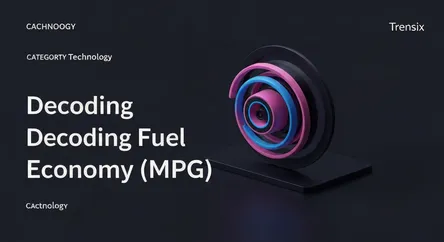Technology
Decoding Fuel Economy (MPG)

Learn what Miles Per Gallon (MPG) means, why it's a key factor in car buying, and how it impacts your wallet and the environment.
What is it?
Fuel economy, commonly measured in Miles Per Gallon (MPG), is a metric used to determine how far a vehicle can travel on a single gallon of gasoline or equivalent fuel. It serves as a primary indicator of a car's energy efficiency. Automakers provide MPG ratings for city, highway, and combined driving conditions, allowing consumers to compare the operational costs and environmental impact of different models. A higher MPG rating signifies better fuel efficiency, meaning the car consumes less fuel to cover the same distance.
Why is it trending?
Fuel economy is a consistently trending topic due to fluctuating gas prices and growing environmental awareness. As fuel costs rise, consumers become more motivated to find vehicles that offer better gas mileage to save money. Furthermore, government regulations worldwide are pushing for stricter emissions standards, compelling manufacturers to innovate with more efficient engines, hybrid systems, and fully electric vehicles. This focus on sustainability and cost-savings keeps MPG at the forefront of automotive discussions.
How does it affect people?
The most direct impact of fuel economy is on a person's finances. A vehicle with a high MPG rating requires less fuel, leading to significant savings at the gas pump over the vehicle's lifetime. This makes MPG a critical factor in car purchasing decisions. Beyond personal savings, improved fuel economy has a broader societal benefit. It leads to reduced overall fuel consumption, which decreases dependency on fossil fuels and lowers greenhouse gas emissions, contributing to cleaner air and mitigating climate change.